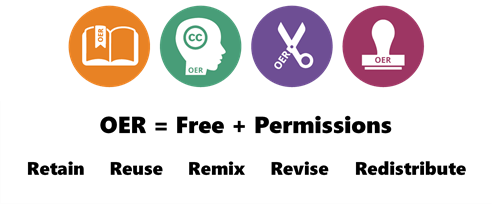Open education is an umbrella term that covers many different practices focused on improving the educational experience for students and faculty alike.
Temple University Libraries is committed to supporting open educational practices in support of lowering the cost of higher education for our students, empowering faculty to gain agency over their course materials, and engaging students with open pedagogy.
To engage in open educational practices, you can:
Customize your resources and reduce barriers for students by creating, adapting, or adopting open educational resources (OER) or other zero-cost materials, such as library-licensed content.
Engage students and collaborate by designing and implementing renewable assignments and other forms of open pedagogy.
Expand your knowledge and explore impacts by engaging in or reviewing open education research.
Adapted from Kwantlen Polytechnic University’s Open Education guide.

Open Educational Resources are "teaching, learning, and research resources that are free of cost and access barriers, and which also carry legal permission for open use. Generally, this permission is granted by use of an open license (for example, Creative Commons licenses) which allows anyone to freely use, adapt and share the resource—anytime, anywhere." (SPARC)
OER include:
OER provides an alternative to the rising costs of education. OER helps to alleviate the burden of student debt while providing opportunities to students who might not otherwise be able to afford or access materials.
In response to the effectiveness of OER compared to traditional commercial textbooks, research now indicates that OER are equally or more effective.
OER also provides an opportunity to try new ways of teaching and learning, many of which are more collaborative and participatory.
Educators across the K-16 spectrum are taking advantage of OER to:
In higher education, faculty are adopting OER as a way to save their students money but also increase the likelihood that students will acquire and read learning content.
Here are some websites, documents and videos useful for learning more about textbook affordability projects and resources:

Email the Open Education Group at openeducation@temple.edu. We will consult with you or connect you to the right person, resource, or service on campus.
Steven Bell
Associate University Librarian
bells@temple.edu
Kristina De Voe
English & Communication Librarian
devoek@temple.edu
Andrew Diamond
Administrative Specialist
adiamond@temple.edu
Courtney Eger
Learning and Engagement Librarian
courtney.eger@temple.edu
Karen Kohn
Collection Analysis Librarian
karen.kohn@temple.edu
Ella Lathan
Assistant Director for Editorial
ella.lathan@temple.edu
Alicia Pucci
Scholarly Communications Associate
alicia.pucci@temple.edu

Unless otherwise noted, original work in this guide is licensed under a CC BY 4.0 license.